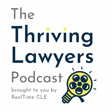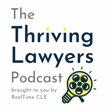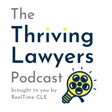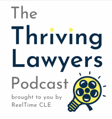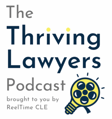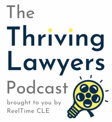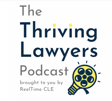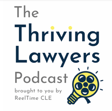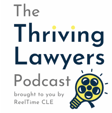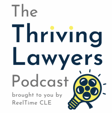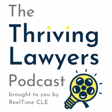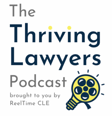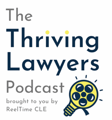Become a Creator today!Start creating today - Share your story with the world!
Start for free
00:00:00
00:00:01

Author/Coach/BigLaw Veteran Wendy Tamis Robbins
Meet Wendy Tamis Robbins, a lawyer with over 2 decades of practice experience, and a self-described "Ph. D in Anxiety." Her new book, THE BOX: AN INVITATION TO FREEDOM FROM ANXIETY is a poignant, moving account of Wendy's life as an all-star athlete, Ivy League-graduate, successful attorney, and cancer survivor-all while battling vexatious forms of anxiety that she had managed to keep hidden from peers and colleagues.
Until she couldn't any more.
Tune in to hear about the new level of freedom, hope, and purpose that she discovered as she both opened up about her mental health challenges and found(ed) a community of like-minded fellow-travelers.
Transcript
Introduction to the Podcast and Guest
00:00:07
Speaker
Welcome to this latest episode of the thriving lawyers podcast. My name is Chris Osborne and I am one half of real time creative learning experiences. And we are the host and sponsor of this podcast. My partner Michael Kahn is not going to be with us for today's
00:00:26
Speaker
But we have a very special guest that we are super excited about. My guest today is Wendy Thomas Robbins, who is a veteran lawyer and a published author. And we have lots of exciting things to talk about. And so I'm just going to get us right into it now.
Wendy's Professional Journey
00:00:43
Speaker
Wendy, it is a thrill to get to meet you and to get to spend some time with you here. Wendy and I found each other. I think we've started seeing each other's posts and things on LinkedIn as one does these days. Lots of us are seeing who's doing amazing work in the well-being space and listeners. And I say that optimistically as if you guys are out there. I believe you are.
00:01:05
Speaker
But you need to be out there for this one. Wendy is doing some amazing work in the realm of telling stories of what it's like to be a human and a person with a story and a background, which, spoiler alert, we all are, as we practice law. And so, Wendy, thank you so much for being here. Tell our listening folks where are you dialing in from and what's your kind of
00:01:28
Speaker
general legal background, Ben, uh, obviously there's some, some changes happening in that regard, but tell us kind of a little bit about sort of what's your, give us that sort of legal bio people might expect. Yeah, sure. So I'm calling in from, uh, Marblehead, Massachusetts. It's on the North shore of Boston. And I went to law school here in Boston and then clerked for a while.
00:01:51
Speaker
and never wanted to go to a law firm. I was in government. I had worked on presidential campaigns and senatorial campaigns in law school and wanted to run for office, was near and dear to my heart, which shows up in the book, as you know. And then was in crisis in my early years as a clerk, a mental health crisis, a financial crisis. I couldn't afford to pay my student debt.
00:02:17
Speaker
and it was creating a lot of pressure. So I went to a law firm. I came back to Boston. I was in Connecticut at the time. My first law firm and then pretty much went in-house for a short stint around six years, but stayed in three different law firms, all big law firms, ending up at Holland and Knight most recently and working the entire time in a little bit of commercial real estate, but mostly in
00:02:46
Speaker
tax credit syndication, which creates our affordable housing section. Yes. And also then for the last maybe eight years of my career, doing more social impact investing and public welfare investing through large institutional clients. Oh, wow. I'm a litigator by training. My brain can't even get around all of that, all the different federal and tax regulations you probably had to figure out how to navigate. That is amazing stuff. Now, when you were in-house, what kind of stuff did you focus on? What was your role like day to day?
00:03:16
Speaker
I was an in-house for a tax credit syndicator. So it was all about, so I was still working on the upper, the structure of the actual investments in the tax credit funds. So they call it the upper tier because you're not working in the dirt on the real estate transactions. You're working on more complex tax sort of nuanced fund,
00:03:43
Speaker
that all of the institutional financial investors are coming into and investing in. Gotcha. OK. And listeners, we're going to spend the next 40 minutes talking about tax law. So buckle up.
00:03:56
Speaker
not really just kidding that people wouldn't just like hang up and leave and yeah we said we set the context um and you're obviously up to some different things now with a book you've published recently uh that we'll talk about certainly that i have begun reading a big fan of uh but to set up our conversation i'm gonna uh and i'm uh listener that's the other thing i've i've been reading winnie's book so i know more of her story than i know of the average podcast guest
00:04:24
Speaker
there's so many places I want to go with it, but I think for our listeners what I would love is for you to set the stage of kind of what it was like for you as a law student and then transitioning into practice. You made a couple references to some stressful things, but when I know you write a lot about struggles with anxiety and stress and all this, when did you really feel like you started noticing that kind of stuff show up in
Mental Health Challenges and Coping Mechanisms
00:04:50
Speaker
a way that you were
00:04:50
Speaker
puzzled and trying to figure out what the heck is going on. What was that like for you as a law student or a young lawyer or a lawyer? When did that kind of thing show up and what were the first signs? So I had my first panic attack when I was six years old. So it had been showing up for a very long time. I took my mental illness into law school with me. You were aware of that? Oh, God, yeah. I had not been treated
00:05:21
Speaker
I had tried to find treatment an undergrad at Dartmouth after I called a suicide hotline because Dartmouth was really the beginning of a real unraveling where I started to have intrusive thoughts, which is part of OCD. I had really bad dissociative episodes and depression and so on top of the anxiety and the panic disorders.
00:05:49
Speaker
And what would that look like, really, if you give it, you know, for listeners who don't know what a dissociative or a disorder or a panic attack? What would that look like if somebody was in a room with you or saw you or knew you? It's interesting.
00:06:03
Speaker
They may not know at all because I just reconnected with someone on LinkedIn who just read my book over the weekend and said, you know, you always seem completely put together and really shy. Quiet side. And I thought because every time I saw you, it was like a lawyer lunge and I was having a panic attack. I was not quiet and shy by any stretch. Oh, my gosh.
00:06:26
Speaker
hyperventilating and shaking and wondering how I could breathe through the next 20 minutes without anyone noticing that I was melting down, essentially. So that's what it would look like. I would take my pulse compulsively to make sure that my heart was still beating, that it wasn't beating out of my chest. And then, so, you know, your typical arc of a panic attack, but the depression and the dissociative episodes that I had looked like
00:06:56
Speaker
Not recognizing. So there's depersonalization and then dissociative. Dissociative is more that you feel like you're in a movie. Like you feel like there's a big, thick pane of glass between you and reality. And you're watching it. You're disconnected from it, sort of watching it happen, sort of almost outside yourself.
00:07:15
Speaker
Exactly. And then depersonalization is looking in the mirror and really not recognizing anything about you and looking at your arms and it doesn't really even feel like it's necessarily connected to your body. And so these are all sort of still mysterious on some level, but just ways that your brain starts to when it feels this overload of depression and anxiety, it really goes into this protection mode. So really detaching from reality in this
00:07:45
Speaker
just as self-preservation. Yeah. Well, one of the things I've been- It's not possible when you're at Dartmouth. Yeah, I was about to say, you might've looked like the average undergraduate Dartmouth student and all. I'm relating to it a little bit just because part of my journey has been, I don't know that I would have, I think I was kind of determined I will not be anxious. They will know, nobody will see me sweat. Nobody will see there anything
00:08:09
Speaker
that there's anything anxious like about me. But the parts of your story that I really resonate with are the idea of dissociating and escaping somewhere else. Like there's a chapter in your book where you talk about, as a kid, because of the chaos that was going on in your home that sounded I could relate to a lot of that, I would escape. And you kind of talked about building a fantasy world in your head and playing with toys by yourself. And I'm like, I'm just a
00:08:36
Speaker
I was a puddle. I'm like, that was my childhood sum, too. But what I've learned over years is I've been thinking about my story and I'm not going to take all the focus from yours. But I've been learning that I have my own ways of staying away from what I probably should be feeling or might be feeling. But I like shut that stuff down before it gets a chance.
00:08:56
Speaker
to take root and say, you should be worried, you should be stressed. I'm like, oh, hell no. I will get lost in a TV show. I will get lost in something I'll entertain. I will make you look over here instead. And so I relate to that process of sort of you're trying to do something with trauma. And the brain is very complex in all the different things it can do to not necessarily feel what we're feeling in a moment. Does that make sense? Does that connect?
00:09:22
Speaker
For sure. And there were years that I could do that. I would call it like the box. It's another box, right? The box in my head where I would take all of that and I would put it in this box and I would shove it to the back and I would just not look at it for very long periods of time. And I can see that looking back now, like high school, I never had anxiety and there were so many other things stimulating me in a positive way that I ran that through until I got to law school and then law school sort of
00:09:50
Speaker
started to, you know, that box, there were too many other things that were too difficult. I really couldn't keep that down because of what had unraveled, I guess, in, in undergrad. But you can do it even just in a pocket of time during the day, right? Like there, these are just places to hide. There's a place to hide. And we become good at, good at that as children when we don't really have any other skills.
00:10:15
Speaker
And I feel like being a lawyer is a great place to hide work. Absolutely workaholics. They're looking for a place to hide. Right. When you go home and drink at night because there's no way to turn all of this stuff off. Right. It's a place to hide. So it's really when you decide that that's more destructive to you than constructive and you're ready to sort of face it. That. Yes. Well, that Joseph Campbell quote, the cave you fear to enter holds the treasure that you seek.
00:10:45
Speaker
was
The Legal Profession and Personal Struggles
00:10:46
Speaker
really so much of my own journey, which I'm sure you can relate to. Yes, when I was just listening recently, one of my favorite podcasts these days, I don't know if you've heard of it, is a woman named Myrna McCallum out of Canada hosts the Trauma-Informed Lawyer podcast, and it is fantastic. In fact, if you want to go listen to that one or not, this one would be well worth your time. She had a great speaker on there named Dr. Ammar Dahl, who is from Australia, who's done a lot of thinking on
00:11:13
Speaker
And he was a lawyer, but he's a psychotherapist, background, all that. And one of the things he said that really stopped me in my tracks is he said, actually law attracts a lot of people who have had traumatic backgrounds or difficult things. And we're not talking about national disasters, earthquakes, you know, murders of the loved ones or things like that. There's other things that we have that many of us, you know, growing up in the 70s and 80s experienced in our families, in our lives, even even more so if we're, you know, people in marginalized communities, people of color,
00:11:42
Speaker
and all that, but there's a lot of other stuff that we've experienced that impacts the body the same way and is traumatic and the memories are sort of fragmented and we don't want to deal with that and a great place to kind of escape from that is in achievement of any sort, particularly intellectual achievement, being really smart, being really logical. So he stopped me in my tracks because he said law actually attracts a lot of people
00:12:08
Speaker
who are looking for a way to say, hey, man, I'm great. I'm special. I'm different because I'm smart. And then we train lawyers to kind of, hey, the rational brain and the left brain analytical stuff is that's the stock in trade. That's what we do. That's what we need to do to think like a lawyer.
00:12:25
Speaker
But we can forget sometimes the humanity, the things we're running from, and then that our clients may not be running from, they may be in the middle of. But yeah, so back to your story. So you're in law school, and this is on your radar, but you're not telling anybody, but it's starting to show up. Give us more a picture of kind of pick up the story there and where it went from there. Yeah, so it showed up there when I, well,
00:12:50
Speaker
I met a few people who were struggling and they were the opposite. They were very physically commanding, I guess I will say. Very charismatic, very athletic. All of these things that you would think are not what an anxious person may present as.
00:13:08
Speaker
It was interesting because once we shared our stories in private, then we stopped looking at each other or making eye contact in all other social areas. Like it was as if it was our secret to be kept and it was to never be talked about again. And looking back, I find that very interesting. Like the world was just a different place than it is now.
00:13:28
Speaker
So yeah, that was sort of part of my cue that this is still not an okay thing to talk about. And I kept pushing it down and pushing it down. I see what you're saying. So you had that, somebody companion, was a companion or connected with you on it, but nobody was going to speak of that beyond just that private relationship.
00:13:46
Speaker
Exactly. Exactly. And the relationships actually deteriorated because those people were sort of like, I don't know what you're talking about and we can't. Yeah. Yeah. So, um, it was just more negative reinforcement around this is not acceptable. And I moved, you know, I graduated and then I didn't have a job because I was still working in government and everyone else had sort of set themselves up into the in law firms. And, uh, that was another,
00:14:16
Speaker
It was like falling off of a cliff without wings or a parachute or anything. It was this vast ocean of opportunity that was paralyzing. It didn't feel good. It wasn't. So I sort of hit another rock bottom and was really spinning out of control, the anxiety. Really, that's what it felt like. I could not listen to one song on the radio. I could not listen. My mind would not unravel. It was just constantly spinning. Yeah.
00:14:45
Speaker
So I found a clerkship and I just sort of hid in that back room of with no windows of a courthouse. And I just dove into writing all of those opinions. And so that's looking for a judge specifically. Yes, exactly. And then I took that was after the New York bar. And then I mean the Massachusetts bar. And then I chose to voluntarily take the New York bar just to keep my mind busy. It was a way to like
00:15:12
Speaker
I thought it was going to keep me from like just going crazy because I was living alone in a state that I didn't know anyone and that was terrifying as well. And so it was sort of this confluence of a lot of different factors, but I did things like, you know,
00:15:27
Speaker
who takes the New York bar exam just because they want to keep their mind busy. Especially if you're going to pick one to take to take an extra one. That's usually not going to make the list unless you have a reason you want to get to work or something. Yeah. So that was a coping mechanism. And then I found my way to my first law firm based solely on, like I said, financial crisis.
00:15:52
Speaker
Okay. And so what, and, and did you start off with the, uh, the, the tax credit related type practice or did you start off with something more generic or tell us how that sort of played out? No, they just needed someone. I, I, um, interviewed in Hartford, Connecticut, and they needed some, a partner in Boston needed somebody to help him on his tax credit practice. And I had never heard of it. And I wondered how we were even going to get paid because it was affordable housing. I'm like, who's paying us? Like, right.
00:16:18
Speaker
makes sense. But there's I didn't realize that there's this whole structure and system around that industry. And it felt like I could sleep at night, you know, I really thought that going to a law firm, I would be selling some part of my soul to the devil, like I really had a very negative connotation going in. But I was like, Oh, there's good work to be done here, you know, that doesn't have to be all negative. And so I found that little niche and was why I stayed for so long, for sure.
00:16:46
Speaker
Well, one of the things I like to highlight for folks who may be listening as well, and there was a time period I taught law school. I may teach law school again someday. I don't know.
00:16:55
Speaker
I love talking with younger lawyers and people coming out of law school to help them hopefully have a little less anxiety and stress about the on-campus recruiting and your first job out of law school. Literally, there is so much more typically out there, so many more types of practices, ways to practice settings than what you get from the on-campus recruiting in most places. You think everybody goes to a firm, you have to do this.
00:17:21
Speaker
But there's a lot more options out there. And your story is a great illustration of it could be something you never heard of. Like I remember us all going into interviews saying, I want to do litigation. I want to do this. And your perspective on what even is out there is so small. I'm guessing you never had a class in law school in tax credit financing or anything like that.
00:17:42
Speaker
But you found something that actually did work that you connected with. You obviously had great brain power to apply to it.
Work Culture and Personal Realizations
00:17:50
Speaker
And I love to get for people to hear that kind of story to know, don't feel the pressure to get it right when you land the first place. You might, but it's pretty rare. Lots of us bounce around different places and it takes a while to figure out what even all the options are, let alone anything about yourself to know where you fit. So important. Exactly. Yep.
00:18:11
Speaker
Yeah. So you're practicing and you think, okay, I've got a very engaging field and I'm going to do good work because it's got kind of a little social mission to it. And so how did things go from there and when did you start having challenges again that started making things more difficult?
00:18:31
Speaker
I would say immediately. I don't think that there was ever a moment that I felt entirely comfortable there. And it really progressed as the lack of autonomy, the lack of control over my time, the having to take public transportation, which had always been well, driving in traffic had always been and is a common struggle for people with anxiety. So yeah, driving into Boston every day.
00:18:57
Speaker
Taking the train things like that. I would have like three or four panic attacks Just in and out and in and out just getting into Boston on the train. So I would get to work exhausted
00:19:09
Speaker
And then try and figure out, how am I going to find food? I can't walk outside. I'd feel like my legs were like jello all day and just could barely walk down the hallway. You know, I just wasn't. And I went to college on a sports scholarship. Like I was, I've been an athlete my whole life. So that was falling apart. And.
00:19:29
Speaker
Then once lunch came, I felt that drumbeat of, okay, who's going to come in and ask me to stay even later, even later. And I had just gotten engaged. So I had this, you know, relationship to be maintaining. And I didn't have maybe a pocket full of years where it was just me and I could just pedal to the metal. Like, no, it was, there was always something else. But so that anxiety started like right away where I didn't realize really what
00:19:58
Speaker
the law firm experience was going to be like. Wow. And in your experience, I guess at that time, did you have anybody that you could talk about that with? You talked about having some people you connected with previously, but was there anybody that would have known anything from you about what was going on? Or were you still trying to mask that and keep everybody thinking you got this, you're rocking along?
00:20:24
Speaker
Yeah, no, I didn't talk to anybody about my own situation, my own mental struggles. I had other close friends who are at big law firms and who were pulling the quote unquote all nighters and things like that. And yeah, I thought, you know, intellectually I can do that. Like I never thought that that was something I couldn't do, but I didn't know how my mental health issues were going to be exacerbated by that or
00:20:50
Speaker
how I would be able to respond in that moment. I was, because I was always, you know, you're the perfectionist, you're the people pleaser, you've been achieving for so long, you're like, no, I'll just make it happen. So I'm pushing through all of these things, I'm pushing through the panic attacks, and I'm still doing the exhausting work of hiding it from everyone. And it looks like everybody else is kind of, you know, and I recognize this when it was,
00:21:19
Speaker
12, 15 years of my career, I realized I had ADD, and I had not ever been diagnosed that. I was high achieving. I would do everything last minute, but I would do it well, so I still got a good grade, so nobody said, hey, we're worried about that kid, and they didn't know. But I remember thinking,
00:21:36
Speaker
Everybody else is just everything seems to work for them. And I go in their offices and they're all neat and organized and everything is in place. And, you know, there's a lot of I think of sort of that image that lawyers sometimes we like to project that we've got it all together. We're cooking with gas. Everything's good in this world. And that made me just feel small and incompetent at times. Yeah, I hear that so much.
00:22:02
Speaker
I just heard it from that person who I said earlier had just read my book this weekend and said, oh, you seem so put together. And he said, I felt like an imposter the whole time. And I'm like, well, you were a male partner. Like, I didn't look at you. You were the imposter. Like, you were the imposter I was supposed to look like, you know. Right.
00:22:20
Speaker
but it's almost like a job requirement. That's the, I think the sad part of it is that you said this earlier that lawyers aren't supposed to appear human because so many other people are counting on them and so many important things are riding on their ability to think critically and be put together. Like you can't show up to court with your papers flying everywhere and like, wow, I had a really rough night and
00:22:47
Speaker
I mean, nobody wants to hear that. And so we have to find other healthy ways to create a more humane and sustainable environment for lawyers so that we are taken care of, we are supported so that when we do go into court or when we do have a meeting or then everything's running the way that it should be running.
00:23:09
Speaker
And I think that's one of the things we're seeing, at least I'm seeing in the in the CLE world and in the places where I get to speak and talk with lawyers. Obviously, post pandemic, it's getting a little better in that we have been forced to sort of work from home for a time. We had sort of an upheaval of everything we're seeing into each other's houses. You're coming from your house today, but we were singing to each other's houses and there can be some of that still. Let me get that image right.
00:23:37
Speaker
But there's also been more freedom. I'm hearing more and more lawyers as I've been in my practice as well saying I can't do that. I've got too many things or I've got a kid thing or I've got to be here. It's become much more commonplace to at least
00:23:53
Speaker
sometimes, in some context, acknowledge our humanity, acknowledge there is more that I do than just this legal job that you have me for. And amongst lawyers, we're having more of those conversations, at least I'm seeing some, it's not everywhere. Part of the challenge too is our clients often, particularly if you work with, I've worked with a lot of consumer, you know, average Joe Citizen clients, not so much business clients, but part of the challenge with them is they sort of have that expectation.
00:24:23
Speaker
that we're the champion, we're the super, everything works for us and we're gonna get it done. That's why they hired us. And it's very difficult to think through, can you show them weakness and that we'll know it's hard or whatever. What was your experience like? So as you're dealing with all this, you're young, kind of getting started in your career, getting engaged, where do things go from there then with your journey? I really was hitting
Turning Points and Personal Growth
00:24:50
Speaker
Ceilings where the partners were not giving me the work that I wanted They just wanted to keep it. They wanted to keep a certain level of it So it wasn't for lack of intellect or desire or ability it so I moved on from there and I had a law firm in mind that I thought was the best of the best and so I ended up there and then I Went through a divorce I it was a one of the first
00:25:19
Speaker
the roads that I really felt like it was in the book. You're not there yet. It's really- No, I'm still in part one. I wrote this book last week. I'll tell you how good it is. I've been reading Bona's book Surrender, which I love and highly recommend, but I had to pause it to read more of Wendy's book. It's that good. Wow.
00:25:39
Speaker
I'm serious. I'm not making that up. I paused at Bono. I'll finish you later, but this was so compelling I just when I ordered on Amazon I read some of the first chapters and saw this is just real. This is so honest and I can read It resonates and it's not wonky and it's not a lawyer II You know, let me give you five principles or ten tactics or 20 things to do It is Wendy's journey and she's super generous with that as she's being here with us So yeah, so
00:26:08
Speaker
catch up for wherever you are. Yeah, so that's when I realized I was in the box. So the name of the book is essentially a metaphor for I used to play in a box, but I was really keeping myself safe, essentially. And then when that box was thrown away, I created this box in my head that was a mental construct. And
00:26:29
Speaker
It was in that moment when I was at the law firm that I thought, you know, I had been running toward that law firm my whole life because I thought that would make me feel loved and not anxious and like I belonged and like I mattered and like I was valuable. And when I got there and I was married and had the house and the dog and everything was worse, I just, it was a mind blow. Like how did this not fix everything? This is what I've been working to, you know?
00:26:58
Speaker
And so I had to decide. I saw the box then as the prison that it actually was. And I had to make a choice. Like, am I going to find my way out of this?
00:27:09
Speaker
mental that I've created or am I just gonna because I could ride this out. I can have my babies with this person and I can just become a partner and I can be a disaster inside and look completely put together and perfect like I have a wonderful life on the outside and is that really the life I want to live and I said I decided no.
00:27:31
Speaker
And that takes a lot of courage and also just self-awareness to be able to recognize that's happening because it's so easy to just keep on the path. And I relate to that as well, the idea of if I meet, if I make partner, if I get to this kind of case, if my wife and I, for us, it was we got the house that we thought
00:27:53
Speaker
Oh, this is the house we never want to leave, you know, and we thought, this will make everything all right. And I'm a partner in law firm. And then when we still, we had some relational challenges and things that were coming from our backgrounds and stuff. And when that stuff was still there, we had fixed all the external things we could fix. And we're still running into these
00:28:11
Speaker
horrifying versions of ourselves, both of us are like, no, no, what? So what do you what'd you do with that? What was that like for you then? You know, you obviously couldn't think about it as wonderfully metaphorically as you do now reflecting, but what did it look like at the time to try to change, you know, the internal and to deal with things? And what was that like? It was a mess, to be quite honest. I was a disaster. It was a mess. I
00:28:40
Speaker
But that's the messy middle that you have to go through. The divorce I describe as a tunnel that I didn't see the end for a very long time. And you're just in the middle of this tunnel. Like, please, nobody write down what I'm saying while I'm here because I do not want to be held accountable for any of this. And I was drinking a lot every night and trying to hide in places that
00:29:05
Speaker
because I didn't know my way out. You know, when you're like, I'm in a prison and I need to find my way out. It's not like, Oh, let's go find Deepak Chopra and hold meditate and start with all of I think that just like I had to do a lot of destructive behavior to get to some bottom of the barrel where I started to then dig my way out. So it was just it wasn't pretty and
00:29:31
Speaker
but it needed to happen. I wouldn't change it for anything. And hopefully my husband at the time and I did as little damage as possible walking away from that marriage. That was for sure my intent. And then I realized that as I was coming out of that, the only people I was seeing, I had moved in with my sister in New Hampshire and the only humans I was in contact with were on my bus. And I thought, if I'm not gonna marry my bus driver or these five men on the bus,
00:30:01
Speaker
I need to move. I need to get out of this law firm because lawyers don't like hang out in the hallways and socialize. And it's not like that at all. I was in my office every day.
00:30:12
Speaker
And it's not the place to go for, especially at that point in time, I guess we're still in the probably early 2000s or so, or late 90s maybe, but it's not the place to go typically for support. Hey, how's it going is usually not looking for a real answer. Like, well, it's like, fine, and I'm good. And I'll have that to you next Tuesday is about the level for a lot of places, not everywhere. So you decide to move. And so where'd you go from there?
00:30:40
Speaker
You know, I was up at five on the six o'clock bus. I was going to the gym at 10 o'clock at night. I was going to bed at 11. It was just not sustainable and, you know, not good for my mental health and not not a not a day full of self discovery. Like how am I going to find my way out of this box? There was no space to even breathe. So I went in house.
00:31:02
Speaker
and found space to breathe for sure. I found my current have been there. So it was a great decision. I didn't know that at the time, but and then ultimately from there moved to Holland a night, which is where I'm just resigning from now, which was a great 12 year experience, but I negotiated a work from home situation there before it was
00:31:26
Speaker
required or the end thing to do. So that also created more space in my life. So all of that gave me the ability to do something like write the book and do that self discovery, self work that that needed to happen so that I could not only find my way out, but then that was, you know, you think it's the end and you've written the book. And then now I look back over what happened in the last year and a half. And I'm like, that was just the beginning, like, you know,
00:31:55
Speaker
You sort of open the door. So I want to take you back for our listeners sake and what did it look like to reach out, like to reach out for help, to try to, you know, do something different. You had to overcome a lot of terror and a lot of fear. And I'm sure the negative messages would come in just an onslaught. What did that first sort of step look like and how did people respond when you found kind of the right people?
Mental Health Stigma in Law
00:32:26
Speaker
Yeah, I didn't really ask for help. I honestly can say that. I stayed in my little world for as long as I could. I think that when I first started posting about it on social media a little bit, when I knew the book was gonna be coming out, is when a partner that I worked closely with, his wife saw it. And he simply said like, oh, my wife has a lot of anxiety. She really likes your posts.
00:32:55
Speaker
And I was like, Oh, okay. That was kind of like the first. Yeah. But after that, it was really just, um, because it was still to me, it was still very off limits. I didn't even know that lawyers could concern for lawyers existed. I never explored our EAP. I, I didn't, I was not looking for help. I was still of the mind that nobody is going to see this. Nobody needs to know.
00:33:21
Speaker
And then it was really the process of writing the book that I wasn't sure would ever even come out, maybe just be on my shelf. Once I thought, you know what? There was just a switch that went off one day when I said, I can help other people. Like, this isn't okay to just save myself. If I can save one more person with this story, that's what has to be done. And that was like the snowball. It was like just something flicking that ball off the edge of that cliff. And there was just no looking back.
00:33:51
Speaker
And after that, it was really the legal process. I said, I'm writing this book and I just want to make sure that it's okay with the firm. And are there steps that we need to take from a professional responsibility, liability, whatever. And so that was really how I navigated the book. And then it wasn't until the head of wellness said, like, I think got wind of it through somebody and we had a conversation and he's like, this is bigger than you think it is. Like, we need to have a program. We need to talk about this. And, and that was really sort of the start of the whole
00:34:21
Speaker
you know, me sort of building a platform and really this, this something igniting inside of me, really lighting that passion up.
00:34:30
Speaker
Yeah, so so I want to back you up there just a little bit uh, you say head of wellness Is that somebody who's actually at was at holland at night and said hey, let's bring you in on Speaking or talking with people and kind of how did that come about and and and how did that look? Uh as it started Yeah, it was a program that we did. Um, just a zoom in about 400 people came from all around the world and from within holland at night but around the world and
00:34:58
Speaker
He interviewed me. It was an interview style hour-long program about my journey my story why I wrote the book he had just read the book and Yeah, it was the first time that I really ever did anything like that and talked about it and it got an overwhelming response because it's like It's like an oxygen mask for people like oh my god It's like a safe place to talk about this and then when I started doing you know, I dove into
00:35:28
Speaker
the ABA-Hazeldin study and what really had been happening in our industry that I had no idea about and then looking at pathways to lower well-being and creating my own CLE programs and then talking even at other law firms and getting the same reaction where people were like,
00:35:44
Speaker
Oh my God, like she's saying that she had it. She's not just talking about anxiety. Like she had the anxiety. Like, is that okay? Say that. Right. Big, big, big difference. Yeah. I was at the point like my train had left the station. I was like, yes, I am. I've got I'm all in. I've got it all. Right. And there's a freedom in that. Yes, it's so freeing. It's it's unbelievable. And it's not
00:36:11
Speaker
And I try and tell people so often, sharing your story is not about attention seeking. It's about stepping into the light so that you give others permission to do the same. And when we're all in there sharing, we're lifting that burden off of ourselves. Like suffering and silence and isolation is just a weight that none of us should be bearing alone.
00:36:31
Speaker
Well, it's one of the things that compounds the suffering because you do feel like, well, everybody else has got it going on. I'm defective. And that just keeps you in that sort of shame prison. I love, though, how you describe when you on the outside, you are you look successful. You are thriving in a law firm.
00:36:49
Speaker
you look you got the college athlete background you got all this i'm hoping that their listeners out there who hear this and feel that sort of freedom for themselves that's for permission to go. I do not have to portray to the world that i have all my shit together like i can actually that that there is a breathing.
00:37:08
Speaker
relaxation that happens when somebody else tells the truth. And we're seeing more of that in law. We're seeing more, a lot of courageous people, like the people you mentioned, working with Institute for Wellbeing and Law, following up on Patrick Krill's work with Hazilden and all that. It's becoming more and more common. It's still hard. There's still a lot of resistance and sort of image management, but
00:37:31
Speaker
It's a little bit safer and a little bit easier, especially post COVID, to have some of these conversations and to say, it doesn't matter what you call it or how we get lost in the whole idea of labels, diagnoses and things. The bottom line is, we're all a lot less okay than we want everybody to think.
00:37:50
Speaker
and there is much power in bringing people together to have more of a conversation like that. It sounds like that's been a worthwhile, like you've been affirmed in your belief that people would gravitate to this, would appreciate this. Talk a little bit about that, and then how that led you to some of the recent parts of your journey, some of the initiatives that you are working on now with, you mentioned Cave Club, and I'd love for you to tell the folks what that's about as well.
00:38:17
Speaker
Yeah, I'd love to. I just want to pause on that for a second. We were just saying though, when we have like, I don't have my shit together. I had my shit together the whole time I was like this, you know? And that's part of it. Like we do have our shit together. There's a difference between I'm not okay. And I'm not saying that like you misspoken anyway, but because that's what people say. But if I think about, so I had cancer last year, I had colon cancer and I have functioned as a lawyer.
00:38:47
Speaker
like perfectly fine with anxiety, with all of the things that I've talked about from a mental health perspective, the only time I could not function on the same mental level is when I was going through chemotherapy. So when we look at the stigma that we attach to anxiety or depression or what have you versus cancer, there's no stigma in cancer. Like we will give you all the space and time that you need because I had no capacity during that time of treatment
00:39:17
Speaker
to sit in front of a computer. I would try for 15 minutes, and I would go to the couch, and I'd be on the couch for six hours after that. You just can't do it. I can imagine. Oh. But when I have anxiety and depression, I can work my ass off. I could hide there all day, and I can hit the cover off the ball. So then why are we so scared, and why are we so shamed of thinking about, oh, there's something wrong with your mind or your brain, or it's just not, it's just a thought error. Yeah.
00:39:44
Speaker
It's faulty math. It doesn't really make sense. And so I really so want to have these conversations more around like, who are we taking care of? What does it mean to say I'm not okay? Is it physical? Is it mental? Does it matter? It doesn't matter. It just matters. If it's compromising your ability to do good work, then we'll talk about what you need. Right, right. That's it. End of story.
00:40:05
Speaker
Well, and part of it is I think we get skewed and we've got a little bit of a challenge in the legal profession because we beat into everybody's head before you take the bar. There's gonna be a character in fitness examination and we're going to examine whether you have the moral character to be a lawyer and that's got everybody scared to death.
00:40:22
Speaker
that somebody's going to flag something and say, ooh, I don't know about this. You were treated for anxiety and depression. That should be absolutely backwards. I'm at the stage in my life where if I'm looking and I know somebody has dealt with stuff and can name what their troubles and their problems are, that's who I want to work with because they're not in denial.
00:40:42
Speaker
and they're doing something about it, and that's actually healthier than what sometimes used to happen. And there's movements of foot to change how character fitness is done or to get rid of it and all, and to try to normalize getting help in law school. There's more movements in that regard as well, more than we can get into. But we start from this, ooh, that's really bad and worse in a different way. And we other and ostracize. And really, we don't realize what a broad brush we're doing.
00:41:12
Speaker
that way and how many people really actually are terrified to say and it's not even everybody's you know a psychopathic you know we're not all Jeffrey Dahmer doesn't have to get to that level we all are dealing with stress dealing with pressure dealing with family loss grief will make us operate differently
00:41:30
Speaker
And normalizing that, that we as humans are, you know, coming to do this work is a helpful thing, but it's still kind of uphill. But so talk about kind of what your experience has been as you've told your story more, as you've gathered people and tell us about Cave Club in particular.
Cave Club and Wellness Initiatives
00:41:46
Speaker
Yeah, so this, I had been talking to women for, since I had had that program, essentially, I became like this safe space and had been talking to primarily women about how
00:41:58
Speaker
The new normal was just, and we see this in all of the research, all the studies show that women because of the, you know, we're expected to do more of the caregiving, whether it be even at work, but essentially at home, that we are being disproportionately negatively impacted. And they just were struggling to find support. Like they couldn't navigate the EAPs because people aren't really sure like what's available and then
00:42:24
Speaker
there were the lines are just the weight is just ridiculous during the pandemic to find a therapist. So essentially, there was this huge gap between the need and the availability, what was actually out there. And so at the same time, I'm building my platform, I'm coaching more, I'm doing more programming, and I'm really like, you know, getting so passionate and this is really becoming my mission.
00:42:50
Speaker
And then I have this huge pause where I have five or six months of just treatment and surgeries and recoveries. And I have nothing else to do but think about, reflect on my own career. What do I want to do for this next precious few years I have? Not just knowing that having that new realization, that new lens that we may not have the time that we think we have. Like really, how do I want to optimize whatever I have left?
00:43:20
Speaker
wanting to create this sense of community that aligns so much with my newfound values and bring these women together and have this amazing supportive space where they're being supported the way that they want to be. And so that's where Cave Club was born, really on the couch last summer. And in a beautiful way, I feel like, you know, I love that line in that sing song. It's like,
00:43:46
Speaker
from a wound. It's something about the flower grows from. Yeah. Anyway, it's an image in my head, but I forget the exact word. It's a footnote in your book, too. I remember seeing it. I saw the sting. Yeah. But I didn't get to the quote part yet. No, because I have the whole song in there. That song is it's Lazarus Heart. It's amazing. Yes. Blood of Lazarus Heart. Yes. Such a good song. Yes. Yeah. So
00:44:13
Speaker
I feel like cave club was part of that. So now I have resigned. It's sort of my full time focus is, you know, there's I have my one among coaching still, I still do my corporate programming, but cave club for professional women is just a wellness community where there's something every day of the week. And there's of course not enough hours in the day to do that much that
00:44:35
Speaker
but knowing that it's there, knowing that it's recorded and available 24 seven, knowing that you have this tribe of women supporting you, giving you accountability, having that personal time with me. It's just something that I always wish I wanted. So it's so much of it's informed by what I have gone through in my trajectory and what I've heard from other women. And yeah, I really, I love it.
00:44:59
Speaker
So is it fair to say, are you seeing it multiply? Like the courage that it took to sort of name what was true for you, tell your story, and kind of put yourself out there. Are you seeing, not now, women aren't just connecting to you, but they're also connecting to one another, and they're finding strength there, regardless of what setting they're in. They've got somebody who's got their back, and it's safe to really let the real stuff show.
00:45:26
Speaker
Yeah, for sure. That's well said. There are so many women that I've talked to that are now couldn't even put their therapy appointment in their calendar. They were terrified to even have that be seen as time in their law firm, who've now since moved to a different law firm and are now advocating for mental health within that other law firm. Like you said, finding their voice in this and celebrating their own neurodiversity because
00:45:55
Speaker
We're bringing different amazing viewpoints of how we're all being human, to your point, in experiencing this life. There's such an enormous range of how we're all going through this thing. And we can all benefit from that. It doesn't need to really be hiding in the shadows.
00:46:15
Speaker
Well, and one of the ways that I've experienced at least that we can benefit from it, if you want to just be mercenary or, you know, self-interested about it. I know as I've processed my own journey, dealt with some of my own, you know, family of origin stuff of a chaotic home, a dad with lots of mental health issues and alcohol issues and stuff, as I have
00:46:35
Speaker
I got in touch with that and figured out how to feel and let myself have some feelings about it. It's actually made me better as a mediator, better as a teacher, better as a lawyer, honestly, because I've always had the left brain analysis. I can go research the law and I know how to file a motion and get to court and all of that. But sometimes a lot of the value that we provide our clients is that presence.
00:46:59
Speaker
that is regulated, that is honest and real. And sometimes I've had the experience of telling my clients, I'm not having such a good day and I'm going to be okay, but I just want you to know how I'm coming in. And there's a
00:47:14
Speaker
a connection that happens sometimes where lawyer and client can see each other as both human, and you're actually on a better wavelength to work together, especially when you ask them to trust you later as you give them guidance about a really hard decision about their life or their business or whatever. It actually, I've been starting to think a lot about, and Ammar Dahl and Myrna McCollum's work on this is, I think, powerful.
00:47:38
Speaker
emotional intelligence and being in touch with our own inner life and our feelings and our bodies and all that is actually a superpower. And it's one we're going to need because the bots are coming. The AI is coming. And guess what? They're going to gobble up and take over all that legal analysis and writing stuff.
00:47:54
Speaker
If we have anything to fear from chat, GPT and AI and stuff, that part might be, you know, taken away. But the human part is the part that's it's indestinctly ours. But do you have any thoughts on that, on that kind of, you know, how you're seeing people in Cave Club or clients you work with? Are they seeing that it's actually helping as they deal with this stuff? Name what's true. Is it helping them in their actual legal work and they're performing better and more sustainably? Oh, absolutely.
00:48:20
Speaker
Yeah, yeah, it's it changes everything. And when people say, you know, thrive, instead of just survive, it sounds like something on the back of a cereal box. But it's actually when you live it, you're it's like an aha moment. You're like, I didn't know it could be like this. I didn't know I could have kind of clarity because you live in that, that cloud of like brain fog and of the self critic and yes,
00:48:46
Speaker
like feeling like your time and I keep preaching this so hard like that you're maybe you are one of your clients that needs to be taken care of but you're the first one to be sacrificed because there's never a shortage of people needing more time more of you more of you and then you leave that connection with yourself to the point that you're not even a safe space anymore because you don't keep your promises to yourself
00:49:10
Speaker
Oh my gosh. What would it feel like to replace that critic with a cheerleader? What if you were your biggest cheerleader every day? Or what if you didn't negotiate away all of the time that you need to spend with yourself to refill your tank? What if you were a risk protector of your own peace? What if you were that protector? I mean, that changed what's going on inside your body, inside your mind. And if that shifts,
00:49:35
Speaker
You have to be showing up in a different, more present, more effective, more efficient way for your clients. You have to. Well, and it helps. I've had to, as I've been a solo practitioner for many years, as I've done teaching and training and stuff, and paying attention to, you know, we all bring a finite amount of energy every day, and the older we get, the less that sort of supply is. And to think in terms of energy management, instead of time management, and then thinking about, okay, how am I going to steward this?
00:50:05
Speaker
And how am I going to show up and recognizing that is a depletable resource and it does get run down. And the first thing I noticed this myself and folks, I golly, I've given how many workshops and lectures on this and I've told lawyers, go and take care of yourself. Myself, I'm much better coach than player because what do I drop when I get stressed and when I don't know what's going to happen?
00:50:28
Speaker
And I got to make everything happen. I drop friends and connections. I drop food. I drop sleep. I stop all the things that fuel me and give me the energy to keep going. But I think I've got to do that to do and to perform. And it's still a shift I'm learning how to do to say, well, I'm going to run out. I'm going to be my own object lesson again. I've told probably thousands of lawyers, put your oxygen mask on first because you have to, blah, blah, blah.
00:50:58
Speaker
But in the throes of it, I can't take my own freaking lessons. That's one of the things I love about the value of the community that you're talking about. A, you're at the head of it and you're staying this authentic person. You're not saying, here's my path to perfection and freedom. It's like, no, here's my perfection. Here's my path to showing up every day as the person I am and navigating the challenges that are there and controlling what I can.
00:51:22
Speaker
navigating around and dealing with what I can, but I've got a tribe of people that are with me and there's something super powerful in that it sounds like. Yeah, there's really magic that happens when you bring, in particular, a group of women together to share their stories and to support each other. It's always a very unique and special experience.
00:51:45
Speaker
And then just the accountability piece, you know, all of the research shows that they're like, well, how does some people have so much more self-discipline than others? And, you know, they can, it's not necessarily that they have more self-discipline, it's that they put themselves in situations where they don't need to use as much self-discipline. Because to your point, it's a limited resource. We don't have, because it takes energy.
00:52:08
Speaker
So when you can find a tribe, we all try and do this on our own. Like, well, I won't find help until something's really wrong, and I'm fine now, and I'll just keep doing this on my own, and then I'll fix it myself. I had one woman say, I just need to lose 10 pounds first, and then I'll join. Like, what does that even have to do with it? Like, you know, like, we're all like, no, we'll do our own work, and then we'll come. Well, that's like cleaning the house before your cleaning people get there. Like, what are you paying them for? Like, that doesn't make sense.
00:52:36
Speaker
So this is really more about don't try and do it all on your own because that's a tank of energy you're using that you can't then utilize to serve your clients or show up for your kids or your partner. Let us be accountable to one another so that we're all together and we don't have to be so self-disciplined. I think it's
00:53:00
Speaker
It's kind of a no brainer. It's podcast listeners. You can't see me, but I'm literally doing like a happy dance in my office. You can't see me well either. Cause we got kind of a fuzzy internet connection for the video, but this is the message that Michael and I have been carrying to people forever is do not try to fight solo. Do not fall for the lot. You're the only one don't try to get yourself out, particularly of a hold that you may have dug yourself into. That's not the best sort of metaphor or idea.
00:53:26
Speaker
But rather, find people who say, I know I've been down that hole. Let me come down in there with you. There's that great parable. They immortalized it on the West Wing and a lot of recovery people talking about it. A guy's down in a hole and I'm not maligning anybody, but a pastor walks by and says, hey, I'll pray for you. Okay, great. A psychiatrist walks by and says, here's your prescription for the anxiety from being down in the hole and gives it to him.
00:53:48
Speaker
And somebody else says, you know, hey, we got some food and stuff waiting for you to come out. But a friend comes along and jumps down the hole. And at first it looks crazy because you're like, well, wait, now we're both down here. But the friend says, yeah, but I've been in this hole before and I know the way out. Come on, let's go. And even if you don't know the way out, but you're at least not alone, it's powerful and it's transformative. So I have a question for you now. I heard you say with Cave Club,
00:54:13
Speaker
This is a safe space for women, and it's for women primarily. Two questions, and then we would kind of end on, try to end at an hour, even though I think we could go on forever and have such a great conversation. One, do you think anxiety and depression, do you have any thoughts on, from people you may have worked with or coached, no names, does anxiety and depression show up differently for men, typically? And secondly, are there spaces where men can, lawyers in particular,
00:54:40
Speaker
form the similar kind of community and work with each other and build each other up. Two questions, two partner. I shockingly over the last few years have had more male coaching one-on-one clients than females. It was not what I expected. So I've had more experience with them than I would have otherwise. I do think it shows up differently. I think the sources of it are very different. We just grow up in different
00:55:10
Speaker
in very different ways in our culture. Different expectations. Yeah. Yeah, exactly. So I think that's where the differences really shine through and then how they're able to express it in emotional ways. Like men don't have healthy ways to release uncomfortable emotions. That's why it shows up in aggression and anger and sports and things like that. Hopefully sports is like a healthy way to do it.
00:55:36
Speaker
Whereas addictive processes would have to be in there as well, probably. Yeah, right. For sure. For sure. Where women at least have more healthy outlets because we turn toward each other, women to women, where men don't typically do that. They sort of face in the same direction and try and find a distraction when they're together. But I think then women have the other side of it where they get labeled as being inappropriately emotional or
00:56:05
Speaker
We have male leaders out there who are very emotional and very easily triggered and things like that, but just commit different things. And so women try and be, it's really about the perfectionism and the people pleasing, and that's where most of women's anxiety comes from.
00:56:23
Speaker
Yeah, I think imposter syndrome is across the board from what I've seen. Everyone, every human seems to have a lot of imposter syndrome because everyone else looks so put together. And it's not until we sort of drop these masks and talk about these issues and normalize them that the imposter syndrome will ever start to go away on any level.
00:56:42
Speaker
Right, right. Basically, as we all own up, there are no imposters. We're basically, you know, all trying to get things done. And we have good days and bad days, strengths and weaknesses. And we have a different mix or a different constellation to use your metaphor for each of us.
00:56:57
Speaker
And what I've found intriguing is to have curiosity more about where somebody else is coming from and giving people the opportunity to sort of say, hey, it might look like I have it all together, but here's kind of where the rough spots are for me. Here's where the bumps in the road are. Can you relate to that? And inevitably, people can relate to something of that. It just happens too often.
00:57:20
Speaker
Mm-hmm. Exactly. Exactly. Definitely. Everyone's got a story. I just had a client. She's in college like two hours ago. And that's exactly what she said. She said, it's so hard because everybody else here has just got it all together. They just look so good together. And I said, when you realize everyone's got a story and the more put together they are, probably the more they're trying to hide. Like I look at people now and I'm like, it's almost like a little thing for me where I'm like, how quickly could I make them cry?
00:57:50
Speaker
Or could I do, it's almost like a game show for me. I'm like, how, cause I know it's in there. I know we all have that point at which somebody's going to connect so deeply with us that we're like, Oh God, what was that? Who's that person? You know?
00:58:05
Speaker
And that's where I went. And I'm like, how quickly can I get there? Not making the other person. Well, one of the things you did to get there is, of course, write your book. And as I said, I think early on, I told Wendy when we were looking at booking this podcast, I'm like, I'm kind of I'm I'm all up in my feelings here to quote Drake in chapter one, because I could relate, because even though my.
00:58:27
Speaker
my childhood difficulties were not exactly the same. There were so many common elements of that instability and that hyper vigilance of when is the next explosion coming from that will require of my seven or eight year old self.
00:58:43
Speaker
And even just to go back and go, I was seven or eight trying to carry stuff that a seven or eight-year-old isn't supposed to. That covers a lot of us, I think, particularly of our generation. And so you've done that. It didn't take you very long to get me to weep, but I might be an easier target for some people.
00:59:01
Speaker
Um, but I cannot recommend the book highly enough folks, uh, the box and invitation of freedom from anxiety. You can find it on Amazon. Uh, I got one and it came in, in, in very quick order. Um, and then the, uh, what's the website where people can find, uh, your resources for both coaching group coaching and cave club type things. Where would people go? Wendy, tamisrobins.com and it's T a M I S and then cave club. Part of that, if, if they can't, if
00:59:31
Speaker
You know, if the spelling is off or something there, there is two B's and Robins. So Wendy Tamas, Robins.com and then cave club.us is for. Um, that's part of it. So either one works. Well, Wendy, this has been delightful and we're coming up on our, I hope I might like to have you back another time. And one of the things I'm noodling on is, uh, golly, where is that space for men? Where's that space for us to be able to kind of let down our guard and talk about the things they're tripping us up.
00:59:58
Speaker
I've got some leanings in that regard. I've been trying to stir that conversation up for a while in the CLE context, but I think you're on to something in that CLE has a place, a role to play, but I love how you're taking it straight to the people and you are connecting the people straight to one another and you don't have to worry about whether somebody's going to give it ethics or mental health credit. It's just, hey,
01:00:19
Speaker
The care is here, the authenticity here, and what I celebrate and hope I can emulate is the story aspect is here. The thing that your book does that I have not seen another book do quite as well. Heidi Brown's book, she was on our podcast a few episodes ago, is phenomenal and does some of this definitely. But the storytelling, the, hey, this is me, this is what happened to me, this is where I've come from.
01:00:44
Speaker
I think that's the special sauce that is the thing that people remember as the thing that combine people together because we relate and we also see each other differently. I know that's been powerful for me like as i've done work in the dei spaces i've heard stories of people who don't look like me and have different alternative options and opportunities in me.
01:01:04
Speaker
I can't see the same, everything the same way. I have to see differently because it's all more human. So I cannot applaud you enough for how you're humanizing and it's real, but it's so readable. It's good writing. It's not just, hey, somebody let Wendy write a book. It's good, good writing, and you'll enjoy it. Any last thoughts that you want to leave the folks with as our time ends here? You've been fantastic. Oh, any final thoughts? I would just say,
01:01:32
Speaker
Don't be afraid to step out. Don't be afraid to speak your truth and realize that or understand that there will be something there to catch you. There will be the people that matter. There will be the systems that hopefully are in place there for you. It's not a leap you have to take alone. No better words to end on than that. Thank you so much, Wendy. Here's our outro and thanks for joining us on this episode.
01:02:01
Speaker
Thanks for listening to this episode of the Thriving Lawyers Podcast. We love hearing from our loyal listeners, so please feel free to email us any questions, comments, suggested topics, or guest recommendations at the following address, feedback at thrivinglawyerspodcast.com.
01:02:17
Speaker
The Thriving Lawyers Podcast is brought to you by real-time creative learning experiences, a national provider of continuing legal education and professional development programs that leave participants engaged, encouraged, and equipped to pursue meaningful and sustainable change in their practices, their lives, and the organizations they work in. And by Osborne Conflict Resolution, your experience guides through the uncharted terrain of business and family law disputes based out of Charlotte, North Carolina. Thanks for listening, and we'll see you next time on The Thriving Lawyers Podcast.
